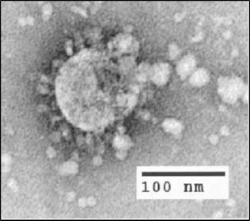Difference between revisions of "SARS"
(desc) |
|||
| Line 3: | Line 3: | ||
|image=SARS_virion.gif | |image=SARS_virion.gif | ||
|constitutes=virus, biological weapon? | |constitutes=virus, biological weapon? | ||
| − | | | + | |description=A corona virus first that killed at least 774 people in 2003, and has since broken out of laboratories 6 times. |
| − | }}'''SARS''' killed about 10% of those who were infected. It never became a [[pandemic]], but was contained | + | }}'''SARS''' killed about 10% of those who were infected. It has never became a [[pandemic]], but was contained after its emergence in 2003 |
==Origins== | ==Origins== | ||
| Line 11: | Line 11: | ||
==Control== | ==Control== | ||
SARS is most infectious in severely ill patients, which usually occurs during the second week of the illness. This delayed infectious period meant that quarantine was highly effective; people who were isolated before day five of their illness rarely transmitted the disease to others.<ref>https://hdl.handle.net/10665%2F70863</ref> | SARS is most infectious in severely ill patients, which usually occurs during the second week of the illness. This delayed infectious period meant that quarantine was highly effective; people who were isolated before day five of their illness rarely transmitted the disease to others.<ref>https://hdl.handle.net/10665%2F70863</ref> | ||
| + | |||
| + | ==Outbreaks== | ||
| + | "The 2003 Severe Acute Respiratory Syndrome outbreak spread to 29 countries, causing more than 8,000 infections and at least 774 deaths." | ||
| + | |||
| + | Subsequently, it has escaped from laboratories at least 6 times, once in Singapore, once in Taiwan, and four times from a single laboratory in [[Beijing]].<ref>https://thebulletin.org/2014/03/threatened-pandemics-and-laboratory-escapes-self-fulfilling-prophecies/</ref> | ||
{{SMWDocs}} | {{SMWDocs}} | ||
==References== | ==References== | ||
{{reflist}} | {{reflist}} | ||
| − | |||
Revision as of 19:10, 21 March 2020
(virus, biological weapon?) | |
|---|---|
 | |
| Interest of | • GreatGameIndia • Zhengli Shi |
| A corona virus first that killed at least 774 people in 2003, and has since broken out of laboratories 6 times. | |
SARS killed about 10% of those who were infected. It has never became a pandemic, but was contained after its emergence in 2003
Origins
In late 2017, Chinese scientists traced the virus through the intermediary of civets to cave-dwelling horseshoe bats in Yunnan province.[1]
Control
SARS is most infectious in severely ill patients, which usually occurs during the second week of the illness. This delayed infectious period meant that quarantine was highly effective; people who were isolated before day five of their illness rarely transmitted the disease to others.[2]
Outbreaks
"The 2003 Severe Acute Respiratory Syndrome outbreak spread to 29 countries, causing more than 8,000 infections and at least 774 deaths."
Subsequently, it has escaped from laboratories at least 6 times, once in Singapore, once in Taiwan, and four times from a single laboratory in Beijing.[3]
Related Quotation
| Page | Quote | Author | Date |
|---|---|---|---|
| MERS | “the method is so sensitive it can identify a single genetic molecule. If such a pathogen for example were to be found lying dormant in a nurse all day in the mucous membrane of her nose, she would be identified as a MERS case without being ill, or even being aware of it. Where previously only critically ill patients were recorded in the statistics, those with very mild symptoms and even completely healthy people were now included. This what explains the surge in cases in Saudi Arabia. This is further exacerbated by the sensational reporting of the local media.” | Christian Drosten | 2014 |
Related Document
| Title | Type | Publication date | Author(s) | Description |
|---|---|---|---|---|
| Document:Logistical and Technical Exploration into the Origins of the COVID-19 virus | report | 31 January 2020 | Jonathan Jay Couey | Report of a thorough investigation into the origins of the virus that caused the pandemic. Whilst the author is circumspect, the evidence presented points clearly to the virus being the product of laboratory engineering. |